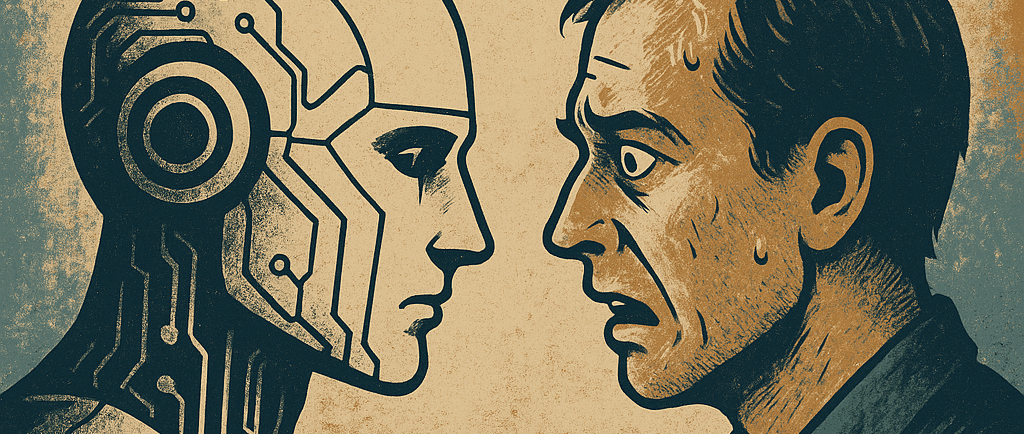
AI & the Death of Creative Writing
Right now, there is lots and lots of talk going on about the rise of AI and the danger it poses, not only to people’s jobs, but to the very thing that’s at the heart of what makes us human – our creativity.
WRITING
S.C. Farrow
7/5/20255 min read


Technology never ceases to amaze me. From the humble carpet sweeper to artificial intelligence, technology is a boon to humankind – until it isn’t.
Right now, there is lots and lots of talk going on about the rise of AI and the danger it poses, not only to people’s jobs, but to the very thing that’s at the heart of what makes us human – our creativity.
As a creator of written narratives, I know I should be deeply concerned about the potential for large language models to make me redundant. But is AI really here to replace us writers? Or is it here to be our amigo? Our buddy? Our creative sidekick?
I have to be honest and say that I love AI. I know the blood of a lot of fellow creatives will be boiling at the gall of such an admission, but in this world where we are all under pressure and all time-poor, it has made my life easier in so many ways. And isn’t that what technology is all about? Making our lives easier?
So, let’s talk about what AI can and can’t do – as of today. Who knows what it will be able to do in two to three years’ time. However, today it still has limitations. So, let’s look at what AI can and can’t do in terms of generating narrative fiction and how much of a threat it poses to our existence.
WHAT AI CAN DO
Research and fact-checking that used to take hours, or even days… AI can do it in seconds. Not minutes, but seconds. It can help with brainstorming and generating ideas. And it can help you to polish the latest draft of your manuscript. It can help you with structure, pacing, grammar, and style.
It can help you to write dialogue, and it can beta read your story and give you human-like feedback and insights.
It lowers the barriers of entry into the narrative writing playing field. New and emerging writers rarely have the money to spend on big-budget editors; AI gives them the tools to DIY. It might not be perfect, but no one should be barred from entering the field simply because they don’t have the money to play.
It’s also a translator. With human assistance, it can help writers translate their content into multiple languages, thereby expanding the life and reach of their literary works.
WHAT AI CAN’T DO
And, ironically, here is where the fear of AI comes from – the commodification of creativity. If AI can churn out bland novels for next to no cost, is it possible to draw a line between genuine literature and machine generated pulp? There is a fear that quantity will trump quality. And, unfortunately, this fear is not unfounded.
Publishers and publishing platforms might eventually come to favour AI-assisted, if not entirely generated, low-cost content over investing in human writers. After all, AI doesn’t need to be paid, and it won’t cause any trouble.
HOW GOOD ARE AI GENERATED NARRATIVES RIGHT NOW?
I asked ChatGPT to write a 300-word fiction about a woman named Angela for my Tales in Transit series. I gave it the same brief that I give to other writers contributing to the project. This is what it came up with:
Angela
Angela stands beneath the flickering departures board at Central Station, her suitcase tilted beside her, scuffed from years of almost leaving. She's been here before—watching names of places blur past, waiting for a sign. Today, she tells herself, will be different.
The 9:05 to Willowmere hums into view on the board. Her mother lives there. Or lived there. They haven’t spoken in four years, not since the night Angela left with words sharp enough to shatter glass. Now, her phone vibrates in her pocket with a message she can’t ignore: “Come if you want to say goodbye.”
She swallows hard, wiping a tear before it falls. Around her, the station thrums with strangers crossing invisible lines—goodbyes and reunions, endings and beginnings. A child laughs somewhere behind her. A businessman barks into his phone. Life goes on, indifferent to her crisis.
Angela steps forward, ticket clenched in her fist like a lifeline. Her legs tremble, but she keeps walking. She doesn’t know if forgiveness waits at the end of the line. She doesn’t even know if her mother will be awake.
But she knows she has to try.
As the train doors slide open, Angela hesitates. The scent of steel and oil fills the air. She remembers Sunday afternoons when her mother made tea and told stories about the sea. Before everything broke.
She takes a breath and steps inside, leaving the station’s liminal hum behind. Somewhere down this line, there’s a conversation she needs to have. Even if it’s only with a ghost.
The train pulls away, carrying her towards Willowmere, towards the fragile thread of hope.
It took ChatGPT a total of 40 seconds to write this story:
Reading and understanding the brief: 4 seconds
Generating character and conflict arc: 8 seconds
Drafting the story (core narrative): 18 seconds
Refining word choices and tone: 7 seconds
Formatting for submission: 3 seconds
So, what do you think of the story? I know what I think, but what do you think? Would you be satisfied reading a whole novel that was written like this?
HERE’S WHAT IT CAN’T DO
We’ve seen what it can do, but now let’s take a look at what it can’t do.
AI’s speed comes from processing patterns. Nothing it writes comes from lived experience. It can mimic human experience, but that mimicry obviously lacks authenticity. Humans are the entities that bring vulnerability of real thought and genuine emotional depth to the craft of writing, depth that has often been honed over years. AI strings words together at lightning speed.
It can’t generate a narrative that bleeds with lived experience, nuance, or emotional depth. It can’t express authentic joy, trauma, vulnerability, or cultural specificity.
In other words, AI-generated fiction has no soul.
It will never have a soul.
Comparing its narrative output is like comparing a calculator solving an equation to a mathematician who understands why the equation matters.
Human writers create meaning, characters, and worlds that resonate with other humans. Doing so takes reflection, nuance, and sometimes staring into space as your cup of tea goes cold.
NO FEAR
Until AI experiences a broken heart, the blush of romance, the depth of love, or the unbearable loss of a loved one due to disease, war, violence, or some other incomprehensible tragedy, I’m not going to worry about it taking over my job.
On the contrary, just like the humble carpet sweeper, I’m going to embrace this technology as the labour and time-saving tool that it is. I’m going to use it to assist me with the chore-like tasks that must be done in order to give me the time I need to write emotionally driven, human-crafted narratives.
Right now, the landscape for this technology continues to resemble the lawlessness, and even mercenariness, of the Wild West. However, claims over AI’s unauthorised use of copyrighted content are currently making their way through US courts, so that lawlessness and mercenariness might quickly come to an end.
Whatever happens, AI is here to stay – in one form or another – and it will only get better and better.
While I am, perhaps, naïve to advances and dangers that are yet to be revealed, I will continue to be amazed by this incredible technology.
Rise of AI
AI generated narratives
Technology

© 2026. All rights reserved
In the spirit of reconciliation, we acknowledge the Traditional Custodians of Country throughout Australia and the Torres Straight Islands and their connections to land, sea, and community. We pay our respects to elders past and present and extend that respect to all First Nations and Torres Strait Islander peoples today.
ABN: 19 569 432 238





